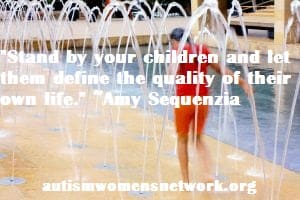
Who Defines Quality of Life?
If it is my life, I do. And only me.
This is one more of those discussions that come up online from time to time.
It is usually related to the discussion around functioning labels and the assumption, a false one, that Autistics need to be “fixed” to have value, to be considered worthy of belonging in society.
Some parents and many self-proclaimed “experts” refuse to learn from mistakes made by other parents and professionals, trying to predict the future of Autistic people.

“Stand by your children and let them define the quality of their own life.” Amy Sequenzia (image description: a child running through sprinklers.)
We have been debunking their assumptions and they insist we are too broken to be allowed to be ourselves.
So, when they see someone talking about how what Autistics need is acceptance, and not “treatments” to look “normal”, they immediately let their lack of acceptance, their low expectations and, in some cases, their self pity get the best of them.
Many so-called experts survive by propagating the idea that there are two classes of Autistics:
One that is “acceptable”, as long as they conform with the majority’s way, as long as they fulfill the majority’s arbitrary definition of independence, of “valued member of society” and of a “contributor” in the community.
The second group are the so-called “severely affected”, the ones who need extensive supports, the ones who are non-speaking or who have difficulty with expressive language, the ones who cannot hide their self-injurious acts, the ones whose appearance shows their disabilities more obviously.
Since it is not in the best interest of such professionals to claim that we need to be accepted just as we are, I will focus on what some parents say about their children, after believing in the absurd notion that there are two classes of autism, and that their children belong to the “second” class (pun intended).
That’s when these parents decide that they can define “quality of life”, that they can forget about acceptance, high expectations, that they can continue the self-pity behavior instead of getting to really know their children.
That’s when they choose to listen to biased opinions instead of listening to the experiences of Autistics who are sharing their experiences and trying to give families a different view, to show them that there are different approaches.
We have been there, and our experiences might help illuminate what is sometimes complicated. Yes, we don’t deny that autism can be complicated but we still want to be respected for who we are.
I feel offended when I read things like: “those kids will have no quality of life”.
I feel offended and sad when the same people go on defending their wrong assumptions even after I tell them my story, even after I tell them about how it feels to be dismissed as a waste of time, space and breathable air.
They ignore my accomplishments – and refuse to have positive expectations for their children – as if I were always eloquent, or as if typing has always been available to me. Some even question my honesty, saying that I am faking my difficulties and needs. Because of their biased-trained assumption of what their children can do, of who their children are, they cannot be “disturbed” by the fact that I was like their children, I still am like their children, and I succeeded in many levels. I debunk their assumptions and they feel the discomfort of having to face their low expectations.
It is probably easier for them to just say that my life – or the lives of people who look a lot like me – as perceived by them, has no quality. I am not “independent” and I need 24 hour care. In their view, this is not acceptable or good enough to be considered a valued member of society.
It makes me sad because these parents are talking about their own children.
They are saying that their children will grow up and have no quality of life.
It scares me because “no quality of life” is the same as “better off dead”. It also means “I am not sure I can love you as you are”. I don’t think that they are listening to their own words and realizing how bad they sound.
The message is: change now, or you are not worthy of my acceptance.
I am not naive. I know that disabilities can suck sometimes, although most of the bad experiences have to do with how society treats us. I also know that I am privileged, since I do have supportive and dedicated family and friends.
It wasn’t always like that and some things are still too hard.
But
My quality of life is outstanding.
It takes work to keep it this way. From me and from people who love me.
I need others to keep believing and supporting me.
I have friends.
I have goals and I am respected by my friends.
To the parents who are right now listing your children’s “deficits” and “undesirable behaviors”, and comparing them to us, measuring who can do more or, to be more accurate, measuring who cannot do things, listen to us:
Although no two people are the same, you will be surprised to find out how similar your children are to some of us. And you will be surprised with whom your children share those similarities.
You will also be surprised to see that “quality of life” is not what you think it is.
Independence is not what you think it is
“Appropriate behavior” is not what you think it is.
Quality of life is defined by each person’s personal achievements.
It is personal.
Quality of life is defined by a person’s surroundings
Quality of life is defined by friendship and relationships.
Quality of life is defined by how much respect the disabled person experiences.
Quality of life is defined by how the disabled person is embraced, accepted, respected.
Don’t be the parent who expects that your children will have a life without worth just because they are not like the majority’s definition of acceptable.
Don’t decide that the life of your children is not worth living.
Stand by your children and let them define the quality of their own life.
 About the Author, Amy Sequenzia.
About the Author, Amy Sequenzia.
